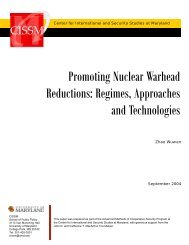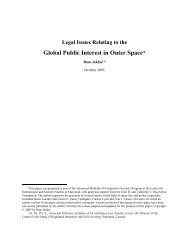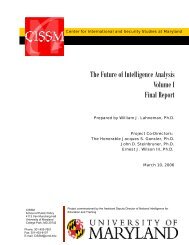A Reassurance-Based Approach to Space Security - Center for ...
A Reassurance-Based Approach to Space Security - Center for ...
A Reassurance-Based Approach to Space Security - Center for ...
- No tags were found...
Create successful ePaper yourself
Turn your PDF publications into a flip-book with our unique Google optimized e-Paper software.
thinking about how existing resources could be combined and expanded in<strong>to</strong> somethingmuch more valuable than the sum of the original parts. Many of the elements would requireunprecedented <strong>for</strong>ms of cooperation, but such cooperation would be much closer <strong>to</strong> currentpractice than is the vision of a nuclear weapons-free world. Building a reassurance-basedregime <strong>for</strong> space security should also be easier than eliminating nuclear weapons because themost consequential security commitments in regards <strong>to</strong> space involve continuing <strong>to</strong> refrainfrom doing things that have never been done be<strong>for</strong>e—i.e., not deploying weapons in spaceor attacking other countries’ satellites. By contrast, nuclear elimination requires the mostpowerful countries in the world <strong>to</strong> give up tens of thousands of weapons that haveconstituted the centerpiece of their security policy <strong>for</strong> the last 60 years.Indeed, establishing some type of reassurance-based regime <strong>for</strong> space security maybe a prerequisite <strong>for</strong> eliminating nuclear weapons. Certainly, Russian and Chinese leadershave indicated that the failure <strong>to</strong> prevent the weaponization of space would destabilize theirstrategic security and that they will not consider deep cuts <strong>to</strong> their nuclear arsenals if theybelieve that the United States will offset its nuclear reductions by deploying more useablespace-enabled conventional global strike weapons. Even if one is not literally a prerequisite<strong>for</strong> the other, progress made and lessons learned in the space case would create a morefavorable context and set valuable precedents <strong>for</strong> the nuclear one.At this critical juncture in his<strong>to</strong>ry, though, it is more important <strong>to</strong> start holdingserious discussions about cooperative steps <strong>to</strong> address core space security concerns than it is<strong>to</strong> know exactly what the desired end product of those discussions would be. The veryprocess of governments <strong>for</strong>mulating their positions <strong>for</strong> space security negotiations wouldarguably encourage as much restraint and responsible behavior in space as would any<strong>for</strong>mally adopted rules. It would prompt more agencies <strong>to</strong> get involved in nationaldeliberations over space security policy; it would encourage countries <strong>to</strong> invest in thetechnical, diplomatic, legal, and other expertise needed <strong>for</strong> space security; it would compelcountries <strong>to</strong> think more carefully about the international security implications of the spacetechnologies they are pursuing; and it would create a structured <strong>for</strong>um in which the stateswith more advanced military space capabilities could talk about how jointly developed rulesand unilateral precedents are likely <strong>to</strong> play out in the future, when many more countries arecapable of doing what only one or a few can do <strong>to</strong>day.31







